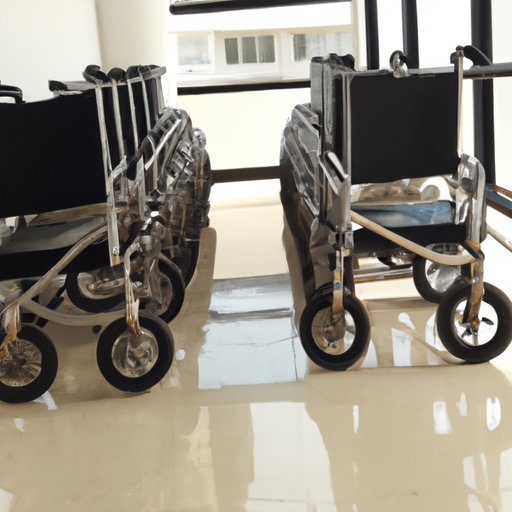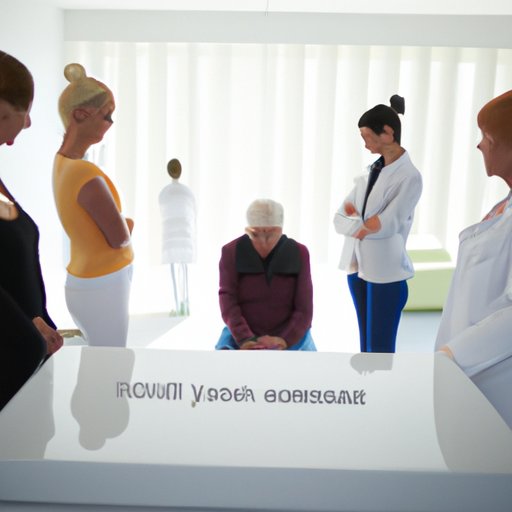Introduction
Donating your body to science is a generous act of altruism that can have far-reaching benefits for medical research, education, and training. When you donate your body to science, you allow researchers and students to study anatomy, develop new treatments and procedures, and gain invaluable experience in the medical field. In this article, we’ll explore the process of donating your body to science in detail, from researching organizations that accept body donations to notifying family and friends of your decision.
Definition of Body Donation
Body donation, or anatomical donation, is the act of donating your body to science after death. When you donate your body to science, it will be used for research and educational purposes. The body may be used for medical research, such as studying the effects of disease on the human body, or for teaching anatomy and surgical techniques to medical students. Donated bodies are typically cremated and returned to the donor’s family after a period of time, depending on the organization’s policy.
Benefits of Donating Your Body to Science
There are many benefits to donating your body to science. Most importantly, your donation helps advance medical research and knowledge, potentially leading to improved treatments and cures for diseases. Your donation also helps provide invaluable experience to medical students, allowing them to gain hands-on experience with the human body. Finally, donating your body to science can save your loved ones the cost of a funeral and burial.
Overview of Steps Involved in Body Donation
The process of donating your body to science involves several steps. First, you must research organizations that accept body donations. You must then learn more about the donation process and requirements, arrange for transportation of your body to the organization, and notify family and friends of your decision. We’ll explore each of these steps in more detail below.

Research Organizations That Accept Body Donations
The first step in donating your body to science is to research organizations that accept body donations. There are two main types of organizations that accept body donations: universities and non-profit organizations. Universities typically use donated bodies for medical research and student instruction, while non-profit organizations often use donated bodies for medical research and training.
How to Find Organizations
You can find organizations that accept body donations by doing an online search for “body donation” or “anatomical donation.” You can also contact local universities and hospitals to inquire about body donation programs. Additionally, some states have special laws governing body donation, so it’s important to do your research and make sure you understand any applicable laws or regulations before proceeding.
Learn More About Donation Process and Requirements
Once you’ve identified an organization that accepts body donations, the next step is to learn more about the donation process and requirements. Each organization has its own policies and procedures, so it’s important to contact the organization directly to get more information. Generally speaking, most organizations require that you complete consent forms and other paperwork prior to donating your body.
Contacting the Organization
The best way to learn more about the donation process and requirements is to contact the organization directly. You can usually find contact information on the organization’s website. When you contact the organization, be sure to ask questions about the donation process, paperwork required, and any other relevant information.
Necessary Paperwork and Consent Forms
Most organizations require that you complete consent forms and other paperwork prior to donating your body. This paperwork typically includes a consent form, which gives the organization permission to use your body for research and educational purposes. Depending on the organization, you may also need to provide additional documents such as proof of identity, a copy of your death certificate, and/or a copy of your will.

Arrange for Transportation of Your Body
After completing the necessary paperwork, the next step is to arrange for transportation of your body to the organization. This can usually be done through a funeral home or other third-party service. Before making arrangements, contact the organization to confirm that they provide transportation services and to get more information about the costs involved.
Making Transportation Arrangements
If the organization you’ve chosen offers transportation services, you can usually arrange for transportation of your body through a funeral home or other third-party service. Be sure to contact the organization beforehand to confirm that they provide transportation services and to get more information about the costs involved. Depending on the organization, you may be responsible for the cost of transportation.
Cost Considerations
Depending on the organization, you may be responsible for the cost of transportation. Be sure to contact the organization beforehand to confirm whether or not you are responsible for the cost of transportation. Additionally, some organizations may offer financial assistance to cover the cost of transportation.

Notify Family and Friends of Your Decision
Once you’ve completed all the necessary steps, the final step is to notify family and friends of your decision to donate your body to science. Notifying your loved ones of your decision can help ensure that your wishes are honored after your death.

Reasons to Notify Family and Friends
There are several reasons why it’s important to notify your family and friends of your decision to donate your body to science. First, it ensures that your wishes are respected after your death. Additionally, it allows your loved ones to understand the significance of your donation and the potential impact it may have on medical research and education. Finally, notifying your loved ones of your decision can help reduce confusion and stress during the grieving process.
Strategies for Notifying Family and Friends
When notifying family and friends of your decision to donate your body to science, it’s important to be clear and direct. Explain why you have chosen to donate your body and the potential impact it may have on medical research and education. Additionally, provide your family and friends with the contact information for the organization you have chosen, as well as any other relevant information.
Conclusion
Donating your body to science is a generous act of altruism that can have far-reaching benefits for medical research, education, and training. The process involves several steps, including researching organizations that accept body donations, learning more about the donation process and requirements, arranging for transportation of your body, and notifying family and friends of your decision. By following these steps, you can ensure that your body is used for the advancement of medical science and education.
Summary of Steps Involved in Body Donation
Donating your body to science involves several steps. First, you must research organizations that accept body donations. Next, you must learn more about the donation process and requirements, arrange for transportation of your body to the organization, and notify family and friends of your decision. Finally, you must complete the necessary paperwork and consent forms prior to donating your body.

Final Thoughts on Body Donation
Donating your body to science is a generous act of altruism that can have a lasting impact on medical research and education. When considering body donation, it’s important to do your research, understand the process and requirements, and notify your family and friends of your decision. With proper planning and preparation, you can ensure that your body is used for the advancement of medical science and education.
(Note: Is this article not meeting your expectations? Do you have knowledge or insights to share? Unlock new opportunities and expand your reach by joining our authors team. Click Registration to join us and share your expertise with our readers.)
